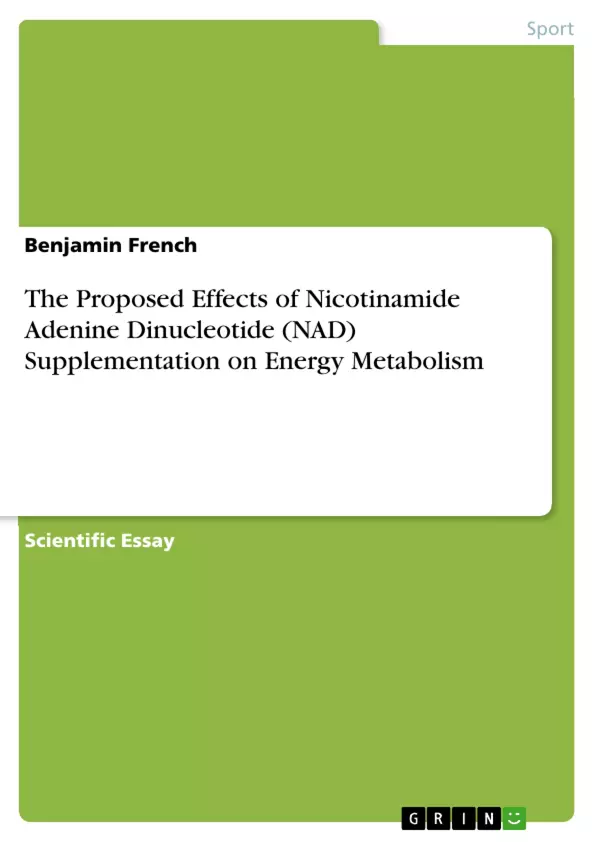Energy metabolism is a process that is essential in the maintenance of life and has obvious roles with regards to sporting performance. Oxygen’s role in aerobic respiration is to act as the final hydrogen/electron accepter to form water. If oxygen is not present the whole aerobic pathway cannot occur and so the body will rely on energy produced anaerobically. The question instantly raised is to whether oxygen is ever in short supply, does it become a limiting factor for energy metabolism?
The body will adapt to training in a variety of manners so that only under extreme conditions is oxygen a limiting factor. All of these adaptations are beneficial from an exercise performance standpoint and increase the efficiency of the complex metabolic process. There are still however questions surrounding the idea that NAD+ plays a key role in this process and whether increasing the synthesis/concentration would be advantageous for the trained individual. Nicotinamide, nicotinic acid, tryptophan and nicotinamide riboside are all natural substances that are acquired in the diet. Due to the protein and other biosynthetic uses of tryptophan it may not be as efficient or indeed practical to use tryptophan as a supplement.
Supplementation of nicotinamide and nicotinic acid appears to increase NAD+ biosynthesis and the intracellular NAD+ pool. Whether these effects can aid in sporting performance is currently unanswered with no research in this area.
Inhaltsverzeichnis (Table of Contents)
- 1. Introduction
- 2. Discussion
- 3. Conclusion
- References
Zielsetzung und Themenschwerpunkte (Objectives and Key Themes)
This text explores the potential effects of nicotinamide adenine dinucleotide (NAD) supplementation on energy metabolism, specifically in the context of sporting performance. It investigates the role of NAD in the Krebs cycle, oxidative phosphorylation, and lactate production, aiming to determine whether increasing NAD levels can enhance aerobic metabolism and improve athletic performance.
- The role of NAD in energy metabolism
- The relationship between NAD and lactate production
- The potential benefits of NAD supplementation for athletic performance
- The influence of training on NAD levels and mitochondrial function
- The limitations of oxygen supply during exercise
Zusammenfassung der Kapitel (Chapter Summaries)
- Chapter 1: Introduction This chapter introduces the importance of energy metabolism for life and sporting performance. It discusses the mechanisms of aerobic and anaerobic energy production, highlighting the role of NAD+ in the Krebs cycle and oxidative phosphorylation. The chapter explores the potential benefits of increasing NAD+ concentration for athletes, suggesting that it could improve aerobic metabolism and reduce lactate buildup.
- Chapter 2: Discussion This chapter delves into the role of oxygen in energy metabolism and its relationship with lactate production. It discusses the efficiency of oxygen delivery during exercise and the factors that can limit oxygen uptake. The chapter explores the possibility of manipulating lactate production by altering the NAD+/NADH ratio and presents evidence for the involvement of NAD+ in lactate metabolism. It also discusses the implications of NAD+ supplementation for athletic performance, particularly in the context of endurance activities.
Schlüsselwörter (Keywords)
The main keywords and focus topics of this text are nicotinamide adenine dinucleotide (NAD), nicotinic acid, energy metabolism, biosynthesis, supplementation, lactate, oxidative phosphorylation, Krebs cycle, athletic performance, training adaptations, and oxygen delivery.
Frequently Asked Questions
What is the role of NAD in energy metabolism?
NAD+ acts as a critical coenzyme in the Krebs cycle and oxidative phosphorylation, facilitating the transfer of electrons to produce ATP, the body's primary energy source.
Can NAD supplementation improve athletic performance?
While theories suggest that increasing NAD+ biosynthesis could enhance aerobic efficiency and reduce lactate buildup, current research has not yet definitively answered if this translates to better sporting performance.
How does oxygen supply limit energy production during exercise?
Oxygen serves as the final electron acceptor in aerobic respiration. If supply is limited, the body relies on anaerobic pathways, leading to quicker fatigue and lactate accumulation.
Which natural substances can increase NAD+ levels?
Nicotinamide, nicotinic acid, tryptophan, and nicotinamide riboside are natural dietary precursors that can contribute to the intracellular NAD+ pool.
What is the relationship between NAD+ and lactate?
The NAD+/NADH ratio is a key factor in lactate metabolism. Manipulating this ratio through supplementation might potentially alter how the body produces and clears lactate during intense exercise.
- Quote paper
- Benjamin French (Author), 2008, The Proposed Effects of Nicotinamide Adenine Dinucleotide (NAD) Supplementation on Energy Metabolism, Munich, GRIN Verlag, https://www.grin.com/document/310459



